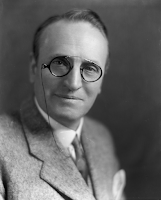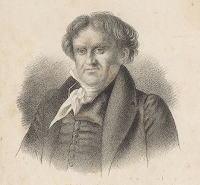‘Introduced bill to curb gambling on the stock market and it is about as popular as an alarm clock in a boys’ dormitory.’ This is from the very readable diaries of Henry Fountain Ashurst, one of the first two representatives from Arizona to be elected to the United States Senate. Ashurst died 60 years ago today, but he left behind a good set of diaries - covering more than a quarter of a century - which were published the same year. One reviewer called him ‘a kindly and witty diarist’.
Ashurst was born in 1874 in a covered wagon near Winnemucca, Nevada, the second of ten children. The family moved to a ranch near Williams, Arizona, when he was two, and he attended school in Flagstaff. Aged 13, he worked as a cowboy on the family ranch. By 19, he was the turnkey at a local jail, and while working there developed an interest in law. For a while he was employed as a lumberjack, studying law at night. He entered Stockton Business College, graduating in 1896, and was admitted to the bar in 1897. Around the same time, he began a political career, serving in the territorial House of Representatives and after two years becoming house speaker. He also spent a term in the territorial Senate. After spending a year in law college, he married Elizabeth McEvoy Reno, an Irish-born widow (with four children from her first marriage).Ashurst was one of the first two Senators elected when Arizona became a state in 1912. He was regularly re-elected, serving for the best part of 30 years, until he was defeated during the 1940 Democratic primary. During his early years in the Senate, he was a supporter of the Woodrow Wilson administration and served as chairman of the Committee on Indian Affairs between 1914 and 1919. When the Democrats lost control of the Senate in 1918, and the presidency in 1920, he became a strident critic of Republican leaders and policy. When the Democrats regained control in 1932, he was appointed chairman of the Judiciary Committee, serving until he left the Senate.
Through his years in the Senate, Ashurst was a notably advocate for the citizens of Arizona (rather than, say, specific national policies). He was a notable public speaker. His most celebrated address - chastising Huey Long in 1939 - was described in Time magazine as ‘one of the most devastating speeches the chamber ever heard’. He was also noted for an eccentric and flexible voting record (switching sides on probation for example), such that he appointed himself ‘Dean of Inconsistency’. In 1941, he took up a post on the US Board of Immigration Appeals, retiring in early 1943. Thereafter, he lived in Washington, D.C., devoting his time to classical poetry and public speaking. He died on 31 May 1962. Further information is available from Wikipedia, the University of Arizona Libraries website, and True West Magazine.
Ashurst kept a diary from 1910 through to 1937. This was edited by George F. Sparks and published by the University of Arizona Press, also in 1962, as A Many Colored Toga: The diary of Henry Fountain Ashurst. The full work is freely available to read online at the HathiTrust website. And a review of it can be found in the Pacific Historical Review. The review begins as follows.
‘A reading of this book will leave the professional historian with mixed emotions. He cannot fail to admire the kindly and witty diarist, and he will appreciate the wonderful opportunity Ashurst had as senator from Arizona for almost thirty years to observe and participate in events of great significance, in the years recorded here (1910-1937). A diary is an extremely individualistic form of literature, and it is ungracious or worse to criticize a diarist for not doing what he did not propose to do. Still, an honest report must state that there is something to be desired in this book. It is a worthwhile volume, as the late senator was a worthwhile political leader; but an adjective such as “great” should be attached to neither. Ashurst enjoyed close intercourse with many “greats” and the diary contains frequent observations on them, often penetrating and revealing although, one realizes upon reflection, always friendly. The Arizona solon seems by nature to have something of a dilettante, with fine instincts and talents but no inclination to penetrate very deeply into any subject, and no goal more specific than that of public service.’
1 May 1912
‘Senator Mark Smith has many friends. He is one of the best storytellers in Congress; and of all the senators, his company is the most sought. His repartee and learning make him welcome everywhere. He is of such vast experience in Congress that my unsophistications nettle him and tax his patience. He is opposing the confirmation of Judge Sloan.’
17 May 1912
‘This fight Mark Smith and I are making against the confirmation of Judge R. E. Sloan, nominated for the district bench, is difficult. I do not dislike Judge Sloan; I have tried many cases before him at nisi prius. In his later years on the bench, he became cross and sour. If Sloan comes to grief, it will be upon that age-old rock upon which many judges have been wrecked, viz., he rides, hunts, fishes, dines, and fraternizes with a few but not with all the lawyers at his bar. Those with whom he does not ride, hunt, fish, or dine are filled with jealousy and rage. He is assailed with a fury which he cannot understand.’
7 April 1913
‘The Sixty-third Congress convened in special session. I believed when elected to the Senate, I would have time and opportunity to study, to explore histories and philosophies for truths that make nations great and peoples free, but alas! all my time since the elections has been consumed by applicants for political jobs.
During last January, February, and March, delegation after delegation of place-hunters came all the long way from Arizona looking for some "appointment.” My weakness is that I have not cultivated the habit of saying NO.
When the second session of the Sixty-third Congress adjourned, President Taft gave a recess appointment to Judge Richard E. Sloan, as District Judge for Arizona, and he served until March 4, 1913, but the Democratic senators filibustered in Executive Session during December 1912 and January and February 1913, and thus defeated the confirmation of Judge Sloan.
The stock-growers are urging a tariff on imported meats, hides, wool, pelts, cattle, and sheep. I stated my views as to our party's promises in the 1912 campaign, whereupon, Senator Stone of Missouri, as is his custom, scolded me severely for “speaking prematurely.” ’
21 April 1913
‘Introduced bill to curb gambling on the stock market and it is about as popular as an alarm clock in a boys’ dormitory.’
28 November 1915
‘Dispatches from the war zone say that reports from Mesopotamia indicate that a British expedition is near Bagdad. Bagdad is the ancient metropolis of the Moslem world and is a sordid slum of a city with a few tawdry mosques that serve to recall the power and magnificence of the caliphate of the days of Haroun Al Raschid, but it is potentially one of those gateways which from time to time adventurous armies strive to take. The country surrounding Bagdad is a land of solitude and mystery, and some say it was the cradle of the human race.’
29 September 1917
‘Washington is now a boom city; it is rushing, shouting, building and hurrying. Owners of lots are letting contracts here for the construction of more hotels and theatres, although wages and the price of material have “skyrocketed” within the past thirty days. In the olden days of the West, we had “boom towns,” such as Virginia City, Gold Hill, Placerville, Carson City, Leadville, Tonapah, Goldfield, Brodie, Rawhide, Tombstone, Cripple Creek, Dawson et al, but Washington is our first “boom city.” ’
4 December 1931
‘A snowstorm of Arctic ferocity has fallen upon the Navajo Indian Reservation in Northern Arizona. Many Navajo Indians have perished in the snowdrifts or frozen in the frosts.
I spent the day at Indian Bureau in arranging relief for them.’
13 August 1932
‘It is, I suppose, a human tendency to try to advance one’s self, and even eminent philosophers seem to desire a social order fitted to the skills and qualities they possess. Plato’s preference was for a rule by the philosophers; Jefferson, a man of virtue and learning, favored a government by the virtuous and learned. The unlearned, incompetent ones, would seek equality by reducing all to mediocrity.
It is becoming obvious as the years roll on that I and the other diarists who are so “truthful” in telling tales about others rarely, if ever, write of our own mean, petty, and contemptible doings but seldom omit recording our own generous and virtuous actions. My opponents derisively say that I have flattered Neptune out of his trident yet Senator J. Hamilton Lewis recently said to me, “Why, dear Prince Hal, you have by making immaterial concessions to human vanity, stimulated many persons into worthy action.”
Be that as it may, it is nobler to be truthful and resolute than to be eloquent, lubricous, and socially and politically eligible. I have been tardy in divining that no matter how meagre, obscure, and indigent a particular human life may be, romance inheres in that life.
To my misfortune, from my earliest sentience, I accepted existence as a futility more honorably endured by complaisance than by resentment; and my failure accurately to appraise and evaluate life was a ghastly mistake, difficult of correction now. I have been a laggard in recognizing the justice of nature and the dignity of mankind. In order to live a worthwhile life, indeed, in order to enjoy even a moderate measure of graceful and felicitous existence, it is requisite that one shall approach life realizing that the universe is operated according to “a good and great plan” and that in harmony with this plan mankind, endowed with reason and conscience, may direct his affairs beneficially if his goal be justice and righteousness. To achieve any durable success one must have a fixed and settled realization that demonstrable truths do exist and that mankind is capable of applying these truths to this life.’






